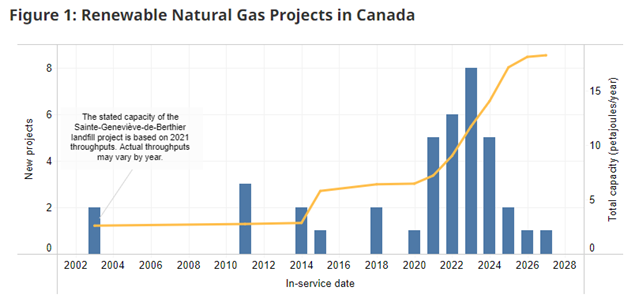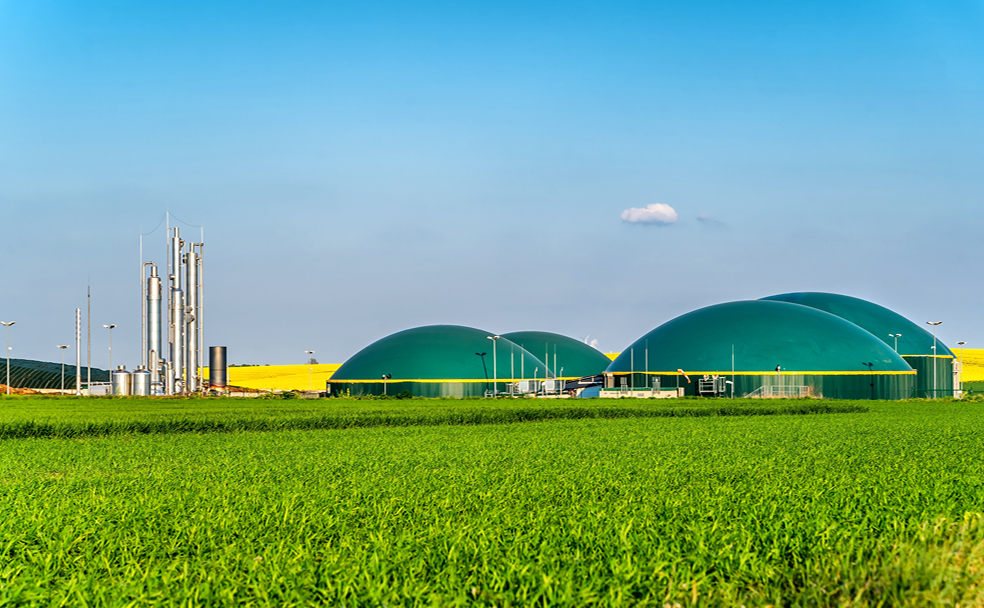Canada’s environmental energy policies have targeted lowering emissions and decarbonization throughout many industries. To reach these challenging targets, various strategies such as tax incentives from the provincial and federal government for Carbon Capture Utilization and Storage (CCUS), new restrictions on emissions for oil and gas development, modifications to clean fuel and electricity rules and plans for natural gas to have a minimum share of renewable sources have been proposed. These regulatory changes have generated increased interest in biogas and renewable natural gas (RNG) production (Figure 1).1

While biogas and RNG production in Canada is gaining momentum, with about 300 operating plants producing electricity and heat and a dozen producing Renewable Natural Gas (RNG),2 it is a robust industry in the European Union (EU) with approximately 20,000 plants operating as of 2020.3 Comparatively, the United States (US) has about 2,400 operating facilities.4 In the EU, biogas and RNG aim to play a major role in decarbonization, while Canada and the US have significant room for growth.
In Alberta, the provincial government has been discussing biogas energy potential for more than a decade,5 however, until recently only a few biogas facilities were operating. The recent approval of two major projects under the Environmental Protection and Enhancement Act (EPEA) has signaled a renewed interest in this sector in Alberta.
What is Biogas?
Biogas is a type of methane produced through the anaerobic digestion or fermentation of organic matter (e.g., manure, low-grade wheat, other agricultural waste, waste from water treatment or landfill waste) by bacteria. Upgraded biogas is known as RNG which can be mixed in with natural gas generated from fossil fuel production to lower the overall carbon intensity of the fuel.
The Regulatory Framework in Alberta
Currently, Alberta does not have a specific regulatory framework for biogas or RNG projects; however, they are subject to similar requirements as other industrial facilities. Proposed biogas and RNG projects typically require various forms of approvals, depending on their design and location, and because they often integrate components regulated under agricultural, oil and gas and municipal frameworks.
Navigating the complex and interconnected network of regulations that can be triggered by an RNG project can be challenging. A biogas or RNG facility will typically require industrial approval under the EPEA, which is under the jurisdiction of Alberta Environment and Protected Areas (EPA). The classification under the Activities Designation Regulation can vary depending on facility design. These nuances of design can also dramatically alter the complexity of the application and the nature of stakeholder interests and concerns.
Many biogas and RNG facilities have power generation which can require approval under the Hydro and Electric Energy Act from Alberta Utilities Commission (AUC). There is often a requirement for self-supply and export, so the facility can generate electricity and heat for plant use and then sell excess power to grid. This is contemplated in the Electricity Statutes (Modernizing Alberta’s Electricity Grid) Amendment Act (2022). Regulations under the Act have not yet been released.
For biogas and RNG plants that use livestock manure as a feedstock, approval from the Natural Resources Conservation Board (NRCB) can be required for manure storage or spreading of digestate produced as a by-product of anaerobic biodigestion. Additionally, EPA, Alberta Agriculture and Irrigation (AGI) and the NRCB have entered into a Memorandum of Understanding that resulted in a Directive outlining how manure as a feedstock, along with digestate, will be regulated.6
Water is needed for operations at most biogas and RNG plants. Water can come from municipal sources or be secured under the Water Act with the approval of a new or transferred water diversion license. Access to new sources of water can be difficult, especially in the southern region of Alberta where new licenses have been restricted for some time.
The transportation of RNG requires the use of pipelines, trucks or rail systems. Building these types of infrastructure can require licenses or approvals from the Alberta Energy Regulator (AER) or Alberta Transportation and Economic Corridors (ATEC). Finally, the construction and operation of biogas and RNG facilities typically require approval from the City or Municipality in the form of a development permit.
Biogas and RNG facilities may also require other approvals at the municipal, provincial and federal level, depending on the nature and scale of the proposed development.
Lessons Learned from Recent Projects
Although Alberta has a strong regulatory framework for traditional energy projects, it is not specifically designed for biogas and RNG projects. This may result in regulators having to adapt these ‘new’ project types to fit into existing regulatory frameworks, causing delays in approval. Regulators may also be less familiar with the associated technologies and processes. Additionally, there may be uncertainty about which agency has authority to regulate these types of energy projects, as aspects of the process can fall under EPA, NRCB and the AER. To alleviate and address some of these concerns, agencies such as EPA have been exploring processes better suited for biogas and RNG projects, aiming to streamline the application development and submission procedures.
Stakeholders, including the public, may have concerns related to biogas and RNG projects, reflecting a range of social, environmental and economic considerations. This can be due to the newness of these types of projects in Alberta and the potential effects and benefits not being widely understood. To address existing and future concerns, thorough planning, transparent communication and early engagement with the local community is often recommended.
The Future of Biogas and RNG
Both the federal and Alberta provincial government signals strongly indicate a significant incentivization towards the decarbonization of the energy sector. Its signals, coupled with the advancement of recent projects in the province, underscore that biogas and RNG are positioned to play a significant role in Alberta’s green energy transition. However, proponents of new biogas or RNG facilities need to understand the regulatory and social complexities of these projects and account for them early in the planning process. There are benefits to allocating extra time in the project development schedule for regulatory and stakeholder consultation.
Developers, regulators and stakeholders can work collaboratively to design biogas and RNG projects that mitigate potential negative effects and provide tangible benefits to the community and the environment.
EXP’s environment and regulatory experts have a proven track record of success in navigating complex energy projects and are here to guide biogas and RNG developers through the process.
For more information, please reach out to Vice President, Environment and Regulatory, Energy – Canada Rachael Powell and Manager of Environment and Regulatory, Energy – Canada Jason Gillespie.
References
- Government of Canada, Canada Energy Regulator. “Canada Energy Regulator / Régie de l’énergie Du Canada.” CER, Canada Energy Regulator / Régie de l’énergie du Canada, 24 Nov. 2023, https://bit.ly/3TKtIvl.
- “Building the Biogas Sector with You.” Canadian Biogas Association, Biogas Projects | Canadian Biogas Association.
- Heidelberg, May 2022 – IFEU, IFEU – Institut für Energie- und Umweltforschung, ifeu.de/fileadmin/uploads/ifeu_ECF_biomethane_EU_final_01.pdf.
- “Biogas Industry Market Snapshot.” American Biogas Council, 26 Sept. 2023, Biogas Industry Market Snapshot | American Biogas Council.
- “Biogas Energy Potential in Alberta.” AGRI-Facts, Government of Alberta, May 2011, https://bit.ly/3vi9b7c.
- Memorandum of Understanding (MOU) among Alberta Agriculture and Irrigation (AGI), Alberta Environment and Protected Areas (EPA), and the Natural Resources Conservation Board (NRCB) Regarding the Storage and Application of Digestate on Agricultural Land. Government of Alberta, 26 June 2023, nrcb.ca/public/download/files/238209.

